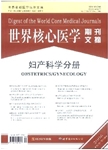对完成最初化疗方案后6~12个月内复发的卵巢癌患者进行卡培他滨治疗的Ⅱ期临床试验,并探讨TS、DDP、TP与治疗的关系:妇科肿瘤组的一项研究
Phase II clinical trial of capecitabine in ovarian carcinoma recurrent 6-12 months after completion of primary chemotherapy, with exploratory TS, DPD, and TP correlates:A Gynecologic Oncology Group study作者机构:Breast Cancer Program Cedars Sinai Medical Center Women' s Cancer Research Institute 8700 Beverly Boulevard Los Angeles CA 90048 United States
出 版 物:《世界核心医学期刊文摘(妇产科学分册)》 (Core Journal in Obstetrics/Gynecology)
年 卷 期:2005年第1卷第7期
页 面:42-43页
学科分类:1002[医学-临床医学] 100214[医学-肿瘤学] 10[医学]
主 题:妇科肿瘤 卡培他滨 DDP TP TS Ⅱ期临床试验 肿瘤标本 毒性反应 生物学指标 磷酸化酶
摘 要:Purpose. A phase II trial was conducted to evaluate the antitumor activity and adverse effects of capecitabine in women with measurable platinum- sensitive ovarian cancer or platinum- sensitive primary peritoneal cancer and to explore the ability of thymidylate synthase (TS), dihydropyrimidine dehydrogenase (DPD), and thymidine phosphorylase (TP) to predict response and toxicities. Experimental design. Patients were treated with a daily starting dose of 2500 mg/m2/day (divided in two doses given every 12 h) for 14 days of each 21- day cycle. Genotyping in the 5′ and 3′ ends of TS was performed in DNA from 23/23 pre- treatment blood specimens. Relative gene expression of TS, DPD, and TP was quantified in 18/21 paraffin- embedded tumor specimens. Results. Of the 27 patients enrolled on study, 2 were never treated leaving 25 patients evaluable. Two patients (8.0% ) achieved a partial response, 13 (52% ) exhibited stable disease, 5 (20% ) displayed increasing disease, and response could not be assessed in 5 (20% ). The median time to progression and survival was 3.9 and 21.2 months, respectively. The most common serious toxicities were nausea/vomiting, gastrointestinal, and dermatological. There was one treatment- related death. TS expression was associated with severe nausea/vomiting (P = 0.039), but not with other severe toxicities. TS genotype or expression of DPD or TP was not associated with any of the severe toxicities. Conclusions. Based on the low response rate, this trial was closed after the first stage of accrual, the drug was not selected for further study in this patient population, and biomarker associations with response could not be assessed.



